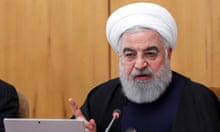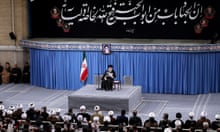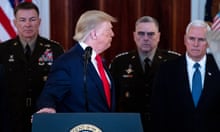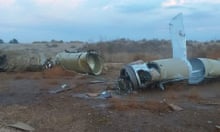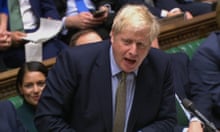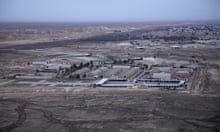European leaders have breathed a sign of relief after Donald Trump heeded their public and private pleas to draw a line under his conflict with Iran and not respond militarily to the Iranian missile attacks on US forces in Iraq.
European leaders had been urging a pause to allow for a de-escalation and even the resumption of talks, calls that were helped by the absence of American casualties either due to good fortune or a deliberate decision by the Iranian military not to direct its 22 missiles at a base in which US forces were more vulnerable.
But the Trump statement contained difficulties for Europe, including a request for Germany, France and the UK to abandon the remnants of the Iran nuclear deal, something European diplomats on balance still regard as a useful mechanism to remain in contact not just with Iran, but also Russia and China.
Trump also demanded in his statement that Nato – by which he predominantly meant Europe – take a greater role in the Middle East. His remarks reflected his belief that the US should be pulling back from the region, especially given it is now self-sufficient in energy and no longer as dependent on oil from the Gulf states.
Although Europe and the US would like to negotiate a new, wider nuclear agreement with Iran, including constraints on Tehran’s regional activities in Lebanon, Iraq and Yemen, divisions between Europe and the US remain on how to achieve this.
Trump announced further sanctions on Iran as an alternative to a missile strike, but Europe has argued US economic pressure only entrenches Tehran’s hardliners. Ben Wallace, the UK defence secretary, was explicit on this point in the House of Commons on Tuesday.
The French president, Emmanuel Macron, will have to judge whether the moment is right to launch a further effort at mediation. He has been pressing Trump to lift sanctions temporarily to open the road to talks, but the US president’s demeanour was of a man focused solely on the potential political benefits of killing who he sees as the world’s leading terrorist.
Most analysts believe Iran will still interpret the past week as having advanced its goal of driving the US out of Iraq and eventually the region. One British expert said: “Iran thinks in terms of campaigns, rather than single episodes. This was a calibrated first response, not sufficiently escalatory to send US Tomahawk missiles towards Tehran, the outcome they wanted to avoid.”
There was also relief in Europe that in his remarks on Wednesday, Ayatollah Ali Khamenei did not discuss further military action, and that the Iranian military spokesman only threatened further action if the US fired back.
Remarks in a tweet and follow-up interviews from Javad Zarif, Iran’s foreign minister, that the attacks by Tehran were proportionate and had concluded were critical in persuading Trump that he could declare Iran was standing down. The decision by the Revolutionary Guards to tell Iranians that 80 Americans were killed in the strike added to the sense that Tehran was not looking to mount a further assault.
But European leaders still pleaded with Trump to show restraint. Hours after the attacks, the UK foreign secretary, Dominic Raab, said Britain condemned the strikes but added that a Middle East war would only be of benefit to Islamic State.
The UK prime minister, Boris Johnson, called on all sides to dial down the crisis while defending the right of the US to act in self-defence.
Ursula von der Leyen, the European commission president, said: “The use of weapons must stop now to give space for dialogue. We are called upon to do everything possible to rekindle talks.”
The EU’s foreign affairs chief, Josep Borrell, said: “One thing is clear – the current situation puts at risk the efforts of the last years and also has implications for the important work of the anti-Daesh [Isis] coalition. It is in no one’s interests to turn up the spiral of violence even further.”
The French foreign minister, Jean-Yves Le Drian, said: “The priority goes more than ever to de-escalation. The cycle of violence must end. France, for its part, remains determined to work to ease tensions. France recalls the importance of continuing the fight against Daesh, with full respect for the sovereignty of Iraq.”
Zarif was inundated with calls from world leaders, including the Turkish president, Recep Tayyip Erdoğan, to prevent any further official attacks.


